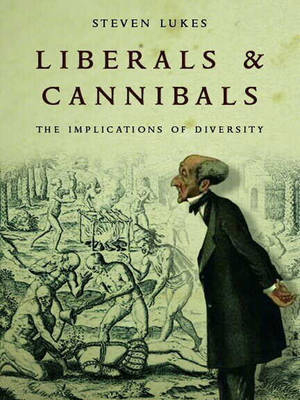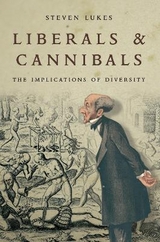
Liberals and Cannibals
The Implications of Diversity
Seiten
2003
Verso Books (Verlag)
978-1-85984-595-0 (ISBN)
Verso Books (Verlag)
978-1-85984-595-0 (ISBN)
- Titel erscheint in neuer Auflage
- Artikel merken
Zu diesem Artikel existiert eine Nachauflage
Taking as his starting point Robert Frost's accusation that a liberal is someone who can't take his own side in an argument, Lukes confronts liberal thought with its own limitations.
The essays in this collection focus on the perennial but newly urgent questions of how the tension between relativism and the moral universalism current in contemporary politics can be resolved within the framework of liberalism. How is liberal society to interpret the diversity of morals? Is pluralism the appropriate response? How does pluralism differ from the widely condemned relativism - more specifically, the double bind of ethnocentric universalism, or 'liberalism for the Liberals, cannibalism for the cannibals.'
Taking as his starting point Robert Frost's accusation that a liberal is someone who can't take his own side in an argument, Steven Lukes confronts liberal thought with its own limitations. While recognizing the dangers of moral imperialism, Lukes argues that a relativist position based on identifying clearly distinct cultural and moral communities is incoherent. Drawing on work in anthropology and philosophy, he examines the nature of social justice, the politics of identity and human rights theory, as well as discussing how ideas drawn from the work of Isaiah Berlin can shed light on these debates.
The essays in this collection focus on the perennial but newly urgent questions of how the tension between relativism and the moral universalism current in contemporary politics can be resolved within the framework of liberalism. How is liberal society to interpret the diversity of morals? Is pluralism the appropriate response? How does pluralism differ from the widely condemned relativism - more specifically, the double bind of ethnocentric universalism, or 'liberalism for the Liberals, cannibalism for the cannibals.'
Taking as his starting point Robert Frost's accusation that a liberal is someone who can't take his own side in an argument, Steven Lukes confronts liberal thought with its own limitations. While recognizing the dangers of moral imperialism, Lukes argues that a relativist position based on identifying clearly distinct cultural and moral communities is incoherent. Drawing on work in anthropology and philosophy, he examines the nature of social justice, the politics of identity and human rights theory, as well as discussing how ideas drawn from the work of Isaiah Berlin can shed light on these debates.
Steven Lukes is Professor of Sociology at New York University. Co-editor of the European Journal of Sociology, his books include Work, Individualism, Power: A Radical View, Marxism and Morality, and The Curious Enlightenment of Professor Caritat.
| Erscheint lt. Verlag | 17.7.2003 |
|---|---|
| Verlagsort | London |
| Sprache | englisch |
| Maße | 163 x 213 mm |
| Gewicht | 408 g |
| Themenwelt | Geisteswissenschaften ► Philosophie |
| Geisteswissenschaften ► Sprach- / Literaturwissenschaft ► Anglistik / Amerikanistik | |
| Geisteswissenschaften ► Sprach- / Literaturwissenschaft ► Literaturwissenschaft | |
| Sozialwissenschaften ► Politik / Verwaltung ► Politische Systeme | |
| Sozialwissenschaften ► Politik / Verwaltung ► Politische Theorie | |
| ISBN-10 | 1-85984-595-9 / 1859845959 |
| ISBN-13 | 978-1-85984-595-0 / 9781859845950 |
| Zustand | Neuware |
| Haben Sie eine Frage zum Produkt? |
Mehr entdecken
aus dem Bereich
aus dem Bereich
Poetik eines sozialen Urteils
Buch | Hardcover (2023)
De Gruyter (Verlag)
59,95 €
Entzauberung und Faszination des Immergleichen in Literatur und Film
Buch | Softcover (2024)
Springer Fachmedien Wiesbaden GmbH (Verlag)
84,99 €
Buch | Softcover (2024)
belleville (Verlag)
20,00 €



